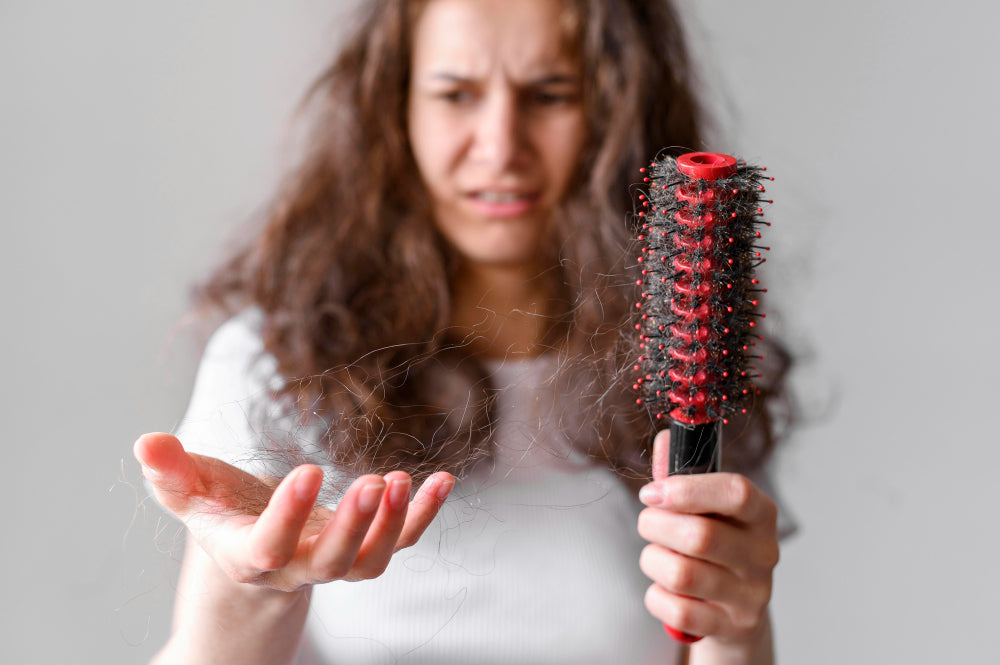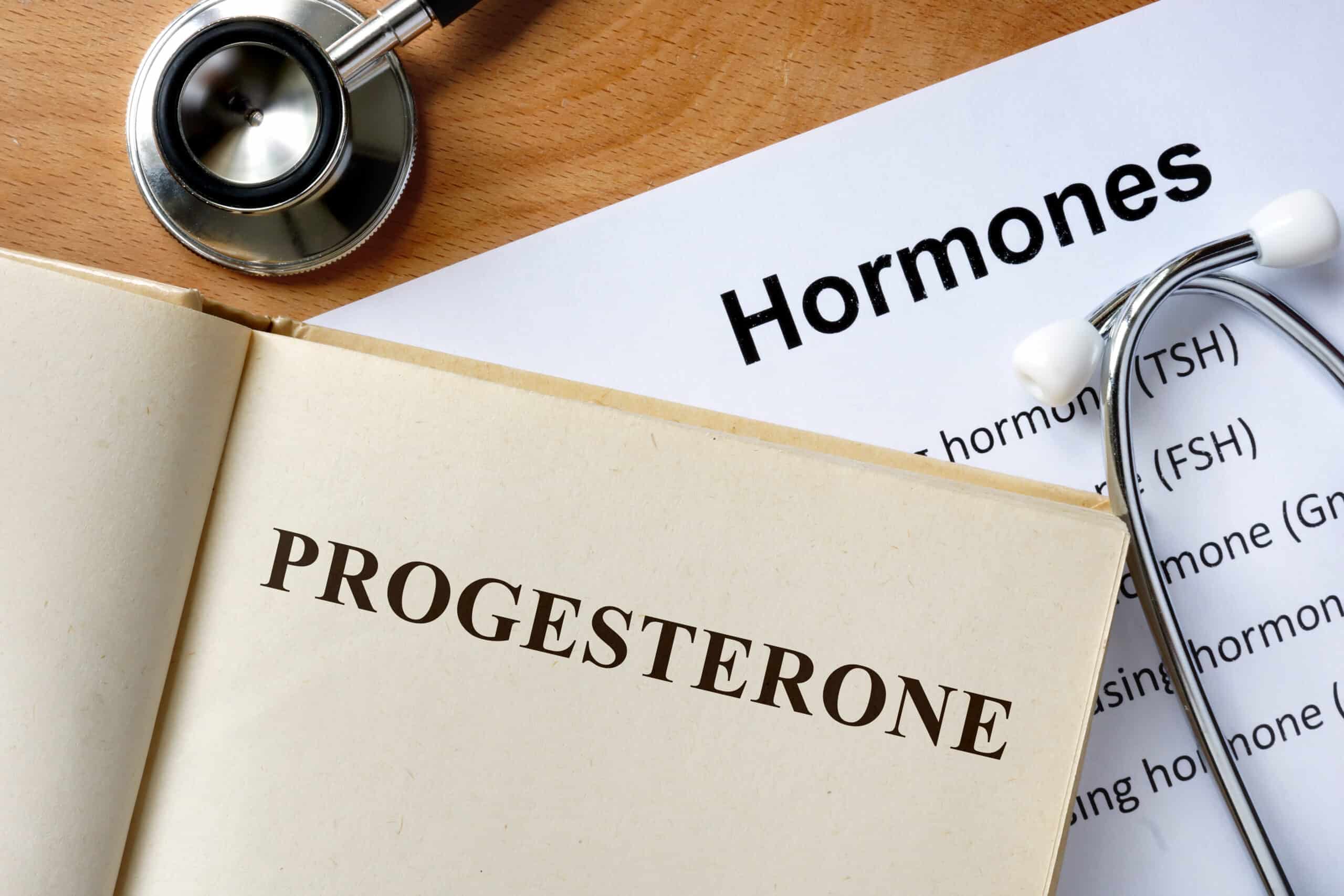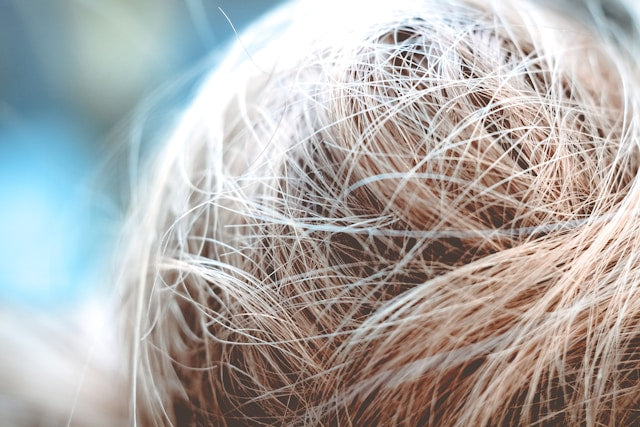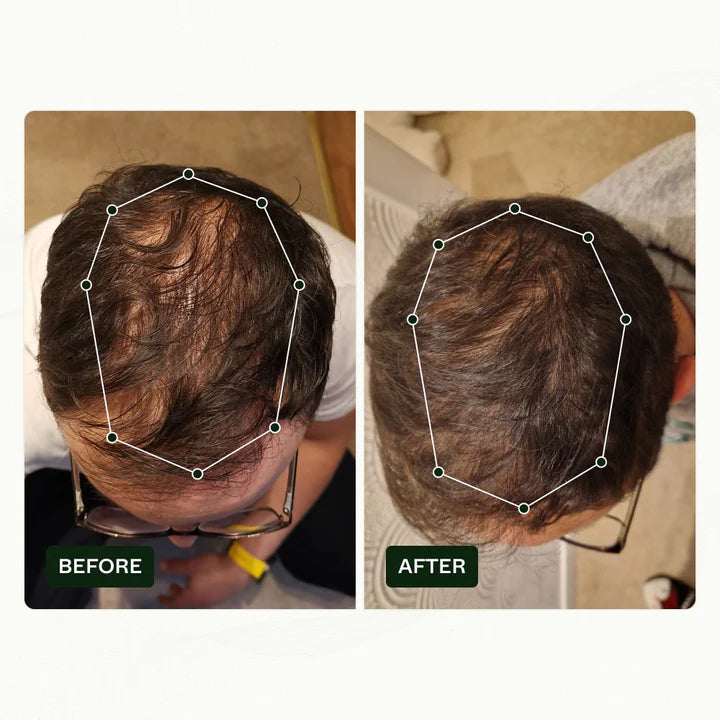Are you curious if applying progesterone cream on the scalp for hair loss can effectively combat this condition and promote hair growth?
This innovative approach has garnered attention for its potential to rejuvenate hair growth and strength.
Dive into our comprehensive analysis to discover the science behind progesterone cream and its effectiveness in treating hair loss.
Table of content
Does progesterone cream treat hair loss?
Applying progesterone cream to the scalp can treat hair loss by inhibiting 5-alpha reductase, an enzyme that converts testosterone into DHT, a hormone linked to hair follicle shrinkage in androgenetic alopecia.
By reducing DHT levels around hair follicles, progesterone cream can help slow or even reverse hair thinning associated with this condition. However, discontinuing the treatment may result in a resurgence of DHT production and the return of hair loss symptoms.
While progesterone cream shows promise, more research is needed to determine the best application methods and understand its long-term effectiveness.
As your leading source for hair health information over the past 4 years, we never compromise on accuracy. When it comes to your health, you deserve information you can truly rely on - and earning your trust is our top priority.
Here's how Scandinavian Biolabs ensures every piece of content meets the highest standards of accuracy and integrity:
- Credentialed Experts: Our reviewers are actively practicing doctors and medical researchers
- Stringent Reviews: Content undergoes rigorous editing by subject specialists and review by a practicing doctor.
- Evidence-Based: We rely on well-established research from trusted scientific sources like peer-reviewed journals and health authorities.
- Full Transparency: Our editorial standards, writer credentials, reviewer credentials, correction process, and funding are all publicly documented.
- Independent Voice: While we do promote products, we operate in a vacuum to business operations. Our main goal is just an unwavering commitment to providing medically-sound guidance.
You can count on Scandinavian Biolabs to consistently deliver the trustworthy health information you deserve. Read our Editorial Standards.
What causes hair loss?

Hair loss can stem from a variety of factors, ranging from genetics to lifestyle choices. Below, we delve into the primary causes in detail.
Genetic factors
Hereditary conditions such as androgenetic alopecia, also recognized as male or female pattern hair loss, are leading causes of damaging hair follicles and subsequent hair loss.
These conditions are influenced by one's genetic makeup and can result in predictable patterns of baldness.
Hormonal changes
Hormonal changes due to pregnancy, childbirth, menopause, or thyroid disease can trigger hair loss, affecting human hair follicles' normal function.
These changes can either be temporary or permanent, affecting hair growth cycles.
Medical conditions and treatments
Certain medical conditions, such as alopecia areata, scalp infections, and trichotillomania, can lead to significant hair loss. Additionally, treatments like chemotherapy can cause hair to fall out.
Nutritional deficiencies
Lack of essential nutrients, such as iron, protein, and vitamins, can hinder hair growth and lead to hair loss. A balanced diet is crucial for maintaining healthy hair.
Stress
Physical or emotional stress can lead to temporary hair loss by damaging hair follicles and disrupting the hair follicle cycle. This is often due to telogen effluvium, a condition where stress pushes hair follicles into a resting phase, leading to hair shedding.
Hair care practices and styling
Overstyling, using harsh hair products, and tight hairstyles can damage hair follicles, leading to hair loss. It's important to adopt gentle hair care practices to prevent damage.
What is progesterone?

Progesterone is a crucial sex steroid hormone predominantly produced in the ovaries, playing a key role in regulating menstruation and supporting pregnancy alongside estrogen. It is responsible for preparing the uterine lining for egg implantation and maintaining the uterus's condition throughout pregnancy.
During the menstrual cycle's second phase, also known as the luteal phase, progesterone production ramps up following the release of an egg.
This surge is facilitated by the corpus luteum, a temporary organ that forms in the ovary after the egg's release.
The hormone's primary function during this phase is to thicken the uterine lining, creating a nurturing environment for a potential fertilized egg to implant and grow.
In cases where pregnancy does not occur, the corpus luteum disintegrates, leading to a decrease in progesterone levels and the onset of menstruation.
This cyclical process underscores the hormone's pivotal role in the reproductive system, illustrating its importance beyond just its contribution to pregnancy.
How does progesterone cream work?

Progesterone cream works by delivering bio-identical progesterone through the skin, directly into the bloodstream. This method bypasses the digestive system, allowing for more efficient hormone absorption and utilization by the body.
The progesterone cream is often used to balance hormones, particularly in individuals experiencing symptoms related to progesterone deficiency or estrogen dominance, impacting the hair follicle cycle during the menstrual cycle.
The application of progesterone cream can help alleviate symptoms associated with hormonal imbalances, such as mood swings, hot flashes, and menstrual irregularities.
When applied to the skin, the progesterone in the cream is absorbed into the bloodstream, where it can then exert its effects on various body systems.
For example, in women experiencing menopausal symptoms or premenstrual syndrome (PMS), the cream can help stabilize hormone levels, offering relief from discomfort.
Additionally, in the context of treating hair loss, progesterone cream on scalp for hair loss is believed to counteract the effects of dihydrotestosterone (DHT), a hormone known to shrink human scalp hair follicles and lead to female pattern hair loss.
By potentially increasing scalp progesterone levels, the cream may help to promote a healthier environment for hair growth, though more research is needed to fully understand its efficacy in this area.
Does too much progesterone cause hair loss?
While progesterone is often considered beneficial for hair growth, excessively high levels of this hormone can indeed lead to hair loss, typically through a process known as telogen effluvium. This condition is characterized by the sudden shifting of hair from its growth phase (anagen) to a resting phase (telogen), resulting in increased hair shedding and loss.
The hormonal fluctuations that naturally occur during events such as pregnancy can demonstrate the complex relationship between progesterone and hair health.
During pregnancy, progesterone levels significantly increase, which, in conjunction with estrogen, is generally thought to extend the hair's growth phase. This can lead to thicker, more luscious hair.
However, not all women experience this positive effect; some may encounter hair loss due to the hormonal shifts, including changes in progesterone levels.
It's important to recognize that while hormonal imbalances can affect hair health, hair loss due to high progesterone levels is typically temporary.
The body often adjusts to these hormonal changes over time, and hair growth can return to normal. Nevertheless, understanding the delicate balance of hormones and their impact on hair growth is essential for addressing and treating hair loss effectively.
How to stop progesterone hair loss?
To address progesterone-related hair loss effectively, it's crucial to first understand the underlying cause. Here's a streamlined approach:
Get a professional diagnosis
Consult with a healthcare provider to identify the specific cause of your hair loss, which will guide the treatment plan.
Treatment for telogen effluvium
If diagnosed with telogen effluvium, the condition often resolves on its own, although treatments like minoxidil can promote hair regrowth.
Managing androgenetic alopecia
For androgenetic alopecia, continuous treatment with topical minoxidil or oral medications like finasteride (for men) or spironolactone (for women) may be advised.
Hair transplant surgery
A hair transplant can offer a permanent solution for restoring hair in bald spots but discuss thoroughly with a specialist first.
Address hormonal imbalances
Treating any underlying hormonal imbalance is critical; this may involve hormone therapy or lifestyle modifications.
Supportive lifestyle measures
Eat a nutritious diet, engage in regular exercise, practice stress management, and adopt gentle hair care practices to support overall hair health.
A better approach for your overall hair health

The Bio-Pilixin Serum stands out as a scientifically formulated solution aimed at improving hair health and combating hair loss. Developed with cutting-edge stem cell technology, it harnesses the power of multiple plant growth factors to nourish hair follicles and stimulate growth.
Its effectiveness is not just anecdotal; the serum has undergone clinical testing, showing promising results in reducing hair loss and promoting new hair growth within as little as 45 days.
One of the key ingredients, Capilia Longa, has been particularly noteworthy for its significant impact on hair health, achieving up to an 89% reduction in hair loss and a 52% improvement in hair density in studies.
Additionally, Niacinamide plays a crucial role in strengthening hair by boosting keratin production, which is essential for the hair's structural integrity.
To enhance the serum's stimulating effect, Vanillyl Butyl Ether is incorporated for its mild warming properties, which can improve blood circulation to the scalp, thereby enhancing the delivery of nutrients and oxygen necessary for healthy hair growth.
Moreover, the serum is 100% vegan, blending nature-inspired ingredients with those designed to replicate their molecular structure for maximum efficacy.
This approach not only promises a reduction in hair loss but also supports the overall strength and vitality of hair, making Bio-Pilixin Serum a comprehensive treatment option for those seeking to improve their hair health naturally and effectively.
Conclusion
The journey to understanding and combating hair loss is multifaceted, with factors ranging from genetic predispositions and hormonal imbalances to lifestyle choices playing significant roles.
Progesterone cream emerges as a potential ally in this battle, offering a natural method to address certain types of hair loss by modulating hormonal activity.
For those exploring additional or alternative solutions, Scandinavian Biolabs' Bio-Pilixin Serum presents a compelling option. Backed by scientific research and clinical testing, this serum targets hair loss with a blend of nature-inspired and scientifically developed ingredients.
With key components like Capilia Longa, Niacinamide, and Vanillyl Butyl Ether, it addresses hair loss from multiple angles, promoting growth, strength, and overall scalp health.
As part of a holistic approach to hair care, incorporating such innovative treatments alongside healthy lifestyle practices can offer a promising path towards improved hair health and confidence.
Remember, while products like those from Scandinavian Biolabs offer promising results, consulting with healthcare professionals for a personalized diagnosis and treatment plan is crucial.
FAQs
Is progesterone a DHT blocker?
Yes, progesterone acts as a DHT blocker. It competes with the enzyme 5-alpha reductase, which is responsible for converting testosterone into DHT. By doing so, progesterone decreases the masculinizing effects of DHT on skin and hair follicles, helping to reduce male-pattern hair characteristics.
Can progesterone help with unwanted facial hair?
Progesterone can help with unwanted facial hair by reducing the conversion of testosterone to dihydrotestosterone (DHT). DHT is the hormone responsible for the growth of dark, coarse facial hair, so by limiting its production, progesterone can mitigate the development of such hair.
Does progesterone assist in treating thinning skin?
Micronized progesterone (MP) is often recommended in clinical practice to treat signs of skin and hair aging in menopausal women, including thinning skin. By enhancing skin health and elasticity, progesterone can help counteract the thinning of skin.
References:
Read more:






